

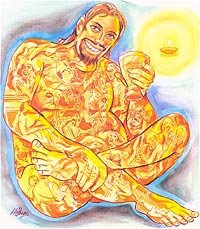 |
Verse 146. One Pacifying Word Is Noble
Explanation: When you are perpetually burning with the flames of passion, what laughter, what pleasure? When you are enveloped in the darkness of ignorance, why do you not seek the light of Wisdom to dispel that darkness? |
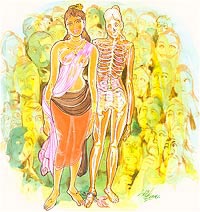 |
Verse 147. Behold The True Nature Of The Body
Explanation: This body has no permanent existence. It is in fact a body of sores. It is diseased. It is propped up by many kinds of bones. It is considered by many to be good. It is well thought of by many. It is glamorously made up. Observe the true nature of the body. |
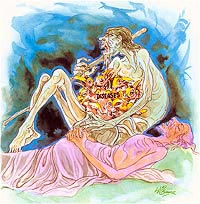 |
Verse 148. Life Ends In Death
Explanation: This form - this body - is fully broken down. It is truly a den of diseases. It disintegrates easily. Out of its nine orifices, putrid matter oozes constantly. It breaks apart. Death puts an end to it. |
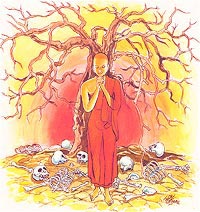 |
Verse 149. A Sight That Stops Desire
Explanation: In the dry autumnal season, one can see bones and skulls strewn around. These dry grey-hued skulls are like gourds thrown here and there. Seeing this, whoever will lust? |
 |
Verse 150. The Body Is A City Of Bones
Explanation: This body is made of bones which form its structure. This bare structure is plastered and filled with flesh and blood. Inside this citadel are deposited decay, death, pride and ingratitude. |
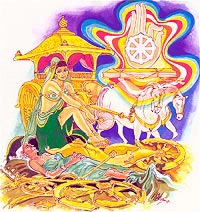 |
Verse 151. Buddha’s Teaching Never Decays
Explanation: Such beautiful and attractive objects as the carriages of kings also disintegrate. The human body too decays. But, the experience of truth never decays. The calm ones experience this truth. Verse |
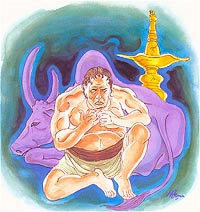 |
Verse 152. Body Fattens - Mind Does Not
Explanation: The person who has scarcely heard the Teaching grows in physique, like a fattened bull. Although his body grows, his self understanding does not. |
 |
Verse 153. Seeing The Builder of The House
Explanation: This tour, this cycle of existence, has run through numerous births without encountering, the builder, the creator of the world and self. For repeated birth is painful. |
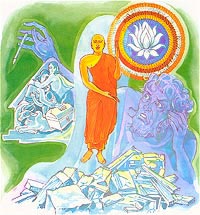 |
Verse 154. Thy Building Material Is Broken
Explanation: Verses 153 and 154 were spoken by the Buddha immediately after his enlightenment under the Bodhi tree, and at a later time was recited to Venerable Ananda in an answer to a question). |
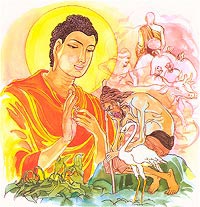 |
Verse 155. Regrets In Old Age
Explanation: In youth they did not lead the higher spiritual life. Nor did they acquire wealth when they were young. Now they are old and incapable. They are similar to those old emaciated, old flightless storks who are sighing away at the bank of a lake without fish. The fish are gone because others have caught them. |
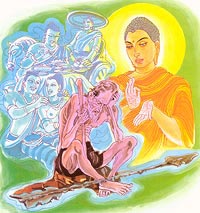 |
Verse 156. Nostalgia For Past Glory
Explanation: This verse captures a situation that is universally true. Most people tend to spend their youth squandering the precious days with no though about the inevitable old-age that will overtake them. Youth is allow to slip by without having garnered either material or spiritual wealth. The Buddha’s admonition to mankind in this passage, is that they must, in time, become mindful of the passage of time and the speedy fading of the glamour of youth. |
| |
|
|
| |
|
|
| |
|
| |
|
|
|
|
|
|
|